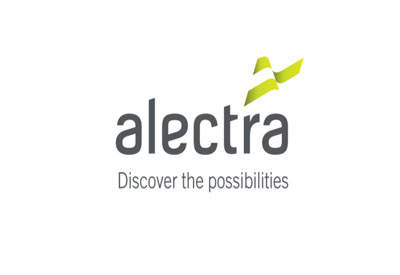Alectra Utilities and City of Markham Support Ontario’s EV Goals

January 18, 2018
Alectra Utilities and the City of Markham unveiled ‘Alectra Drive for the Workplace’, a two-year pilot program at the Markham Civic Centre that will assess the impact of daytime electric vehicle (EV) charging at workplaces on Ontario’s electricity grid.
This first-of-its-kind initiative involves the use of 16 Level 2 EV charging stations, 10 outdoor and six indoor for program participants only, plus one Level 2 charging station for public use.
By making EV charging stations more accessible, the Alectra Drive for the Workplace program will help reduce battery range anxiety for participating drivers, and support the province’s goal of increasing EV sales to five per cent of all new passenger vehicles sold by 2020.
A unique feature of the Alectra Drive for the Workplace project is the Distributed Resource Management System (DRMS) provided by Schneider Electric, which will manage and minimize the electricity needed by the Markham Civic Centre and EV charging stations during peak hours while providing adequate charge to the electric vehicles. The DRMS will collect real-time data to optimize electricity loads to the EVs and building service equipment.
“We are excited about launching the Alectra Drive for the Workplace program at the Markham Civic Centre,” said Brian Bentz, President and CEO, Alectra Inc. “Our business customers are seeking simple solutions to implement workplace EV charging systems that manage electricity demand and energy costs, while providing their employees with the technologies they need to confidently drive their EVs to and from work.”
“We are proud that the Markham Civic Centre was selected as one of the locations to execute this important EV charging pilot program in Alectra Utilities’ service territory,” said Markham Mayor Frank Scarpitti, who is a member of the Alectra Board of Directors. “The reduction of greenhouse gas emissions aligns with the Greenprint, Markham’s Community Sustainability Plan, which targets net zero energy, water, waste and emissions by 2050.”
“Canadians made it clear through our national energy dialogue, Generation Energy, that the move to electric vehicles and lower-carbon fossil fuel alternatives is necessary for the transition to a low-carbon economy,” said Canada’s Minister of Natural Resources, the Honourable Jim Carr. “This pilot program will make it easier for people to drive clean and will gather valuable data that can help bring us closer to a low-carbon transportation future.”
“As the use of EVs becomes more common in Ontario, the increased load from vehicle charging will need to be managed in order to reduce costs to building owners and utilities,” said Terry Young, Vice-President, Policy, Engagement and Innovation, Independent Electricity System Operator (IESO). “Understanding the impact of daytime EV charging at workplaces will help us to manage peak demand on the provincial electricity grid and reduce future electricity infrastructure investments.”
The Alectra Drive for the Workplace pilot program is being funded by the IESO Conservation Fund as well as by Natural Resources Canada who provided funding through its Electric Vehicle Infrastructure Demonstrations component of the Energy Innovation program. Alectra Utilities and its partners will fund the balance of the program through a combination of funding and in-kind services and products. The charging stations will be powered by Aviva Canada, who has generously covered the cost of electricity. Other corporate partners supporting the program include Schneider Electric, FleetCarma, Util-Assist, Robertson Bright, Plug’n Drive, Eguana Technologies, and FLO.











![Guide to the Canadian Electrical Code, Part 1[i], 26th Edition– A Road Map: Section 56](https://electricalindustry.ca/wp-content/uploads/2022/11/Guide-CE-Code-2.png)



